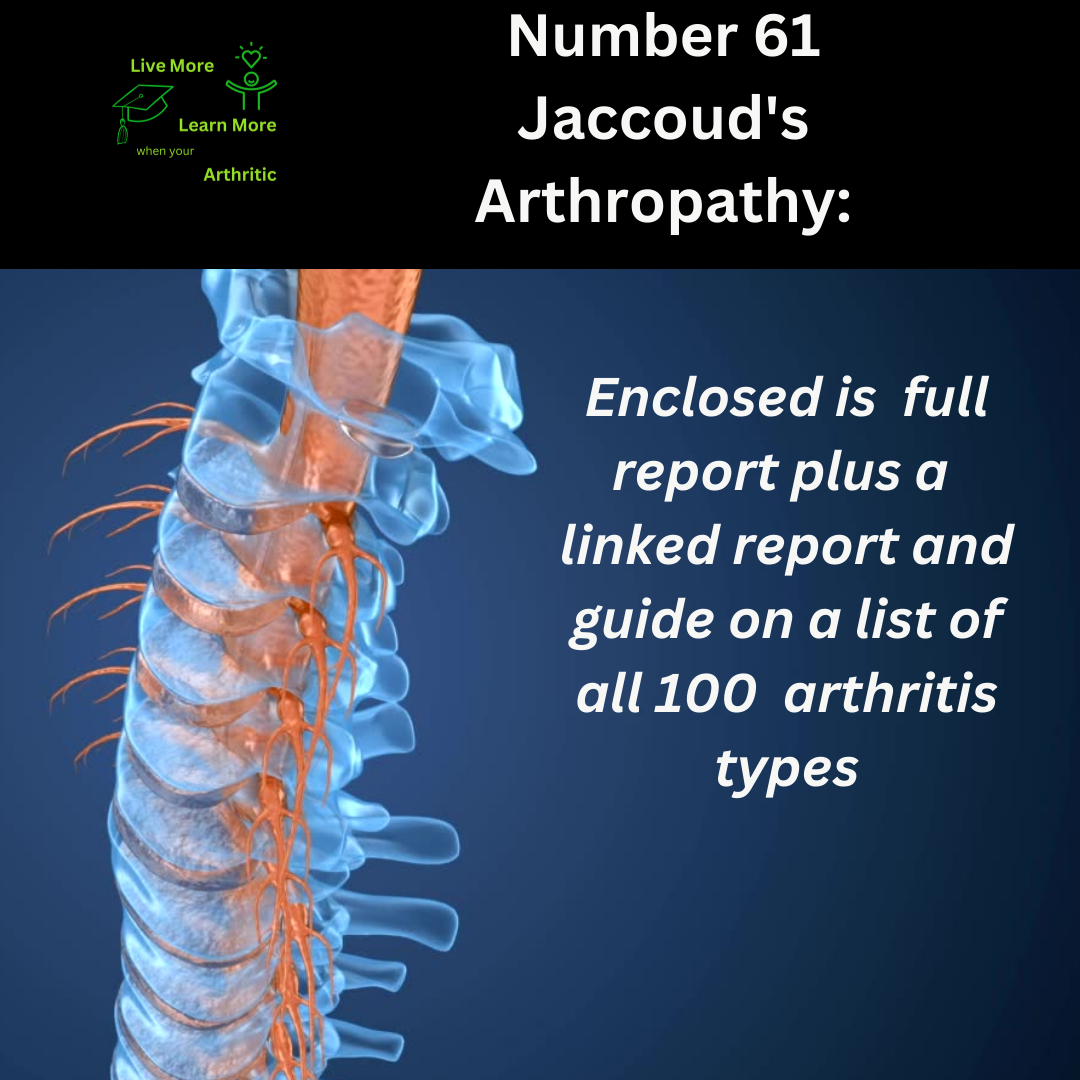
Jaccoud’s Arthropathy: Number 61 on the list of 100 types of Arthritis
Jaccoud’s arthropathy is a rare joint condition that affects a person’s quality of life but often doesn’t impact lifespan in a substantial way. It’s most commonly associated with the autoimmune disease systemic lupus erythematosus ( SLE), although it can occasionally occur with other autoimmune disease. Unlike other forms of arthritis, Jaccoud’s arthropathy is unique in that it is not directly caused by inflammation or destruction of joint tissues. Instead, it is thought to result from the formation of scar tissue in the ligaments surrounding the joints, leading to a characteristic deformity known as ‘Jaccoud’s deformity.’
 The term ‘remission’ in the context of Jaccoud’s arthropathy typically refers to a period when the symptoms are less active or not causing significant disability. Achieving remission in Jaccoud’s arthropathy can be challenging, as the underlying autoimmune disease ( SLE) often requires management to prevent flare-ups and joint complications.
The term ‘remission’ in the context of Jaccoud’s arthropathy typically refers to a period when the symptoms are less active or not causing significant disability. Achieving remission in Jaccoud’s arthropathy can be challenging, as the underlying autoimmune disease ( SLE) often requires management to prevent flare-ups and joint complications.
Description of Jaccoud’s Arthropathy
Jaccoud’s arthropathy is characterized by joint deformities that resemble those seen in rheumatoid arthritis (RA) but are non-erosive, meaning they do not cause the typical joint damage seen in RA. The joints affected are typically the fingers, wrists, and knees. The deformities include ulnar deviation of the fingers, swan-neck deformities, and flexion contractures of the joints. These deformities are caused by the laxity of the ligaments surrounding the joints due to fibrosis (scar tissue formation).
Causes and Triggers
The exact cause of Jaccoud’s arthropathy is not fully understood, but it is believed to be linked to the immune system’s response in autoimmune disease like SLE. In SLE, the immune system attacks healthy tissues and organs, leading to inflammation and potential scarring of the ligaments around the joints. Trauma, repetitive stress, or hormonal changes may trigger or exacerbate symptoms in susceptible individuals.
Symptoms
The symptoms of Jaccoud’s arthropathy include joint pain, stiffness, and deformity. Limited range of motion is a hallmark feature due to the structural changes in the ligaments and tendons surrounding the affected joints. The deformities can be progressive and may worsen over time if not managed appropriately.
Common Ages of Onset
Jaccoud’s arthropathy typically manifests in young to middle-aged adults, often between the ages of 20 to 40 years, especially in those with underlying autoimmune disease like SLE.
Lifespan Impact
Although Jaccoud’s arthropathy can significantly impact quality of life due to joint deformities and limitations, it does not usually shorten one’s lifespan directly. The prognosis largely depends on the management of the underlying autoimmune disease condition.
Autoimmune Nature
Yes, Jaccoud’s arthropathy is considered an autoimmune disease form of arthritis, secondary to autoimmune disease like SLE.
Achieving Higher Quality of Life
A proactive approach involving regular monitoring, joint protection strategies, physical therapy, and management of the underlying autoimmune disease can improve the quality of life for individuals with Jaccoud’s arthropathy. Early intervention and treatment aimed at controlling inflammation and preventing joint damage are crucial.
Complications of Jaccoud’s arthropathy can include severe joint deformities leading to functional impairment, reduced mobility, and difficulty performing daily activities. Chronic pain and psychological distress due to changes in appearance and physical function are also common.
Natural Breakthroughs or Health Advantages
There are no specific natural breakthroughs or health advantages associated with Jaccoud’s arthropathy. However, adopting a healthy lifestyle with regular exercise, balanced nutrition, and stress management can support overall well-being.
Gender and Age Prevalence
Jaccoud’s arthropathy can affect both men and women, but it is more commonly seen in women, especially those with autoimmune disease like SLE.
Interconnected Diseases or Conditions
Jaccoud’s arthropathy is most commonly associated with SLE but can also occur in other autoimmune disease like systemic sclerosis and rheumatoid arthritis. Understanding these interconnected conditions is important for comprehensive management and treatment planning.
In summary, Jaccoud’s arthropathy is a unique and relatively rare joint condition associated with autoimmune disease like SLE. While it can significantly impact quality of life due to joint deformities and limitations, proactive management focusing on controlling inflammation and preserving joint function can improve outcomes and overall well-being. Collaboration with healthcare providers experienced in autoimmune disease is essential for personalized care and optimizing long-term outcomes.
